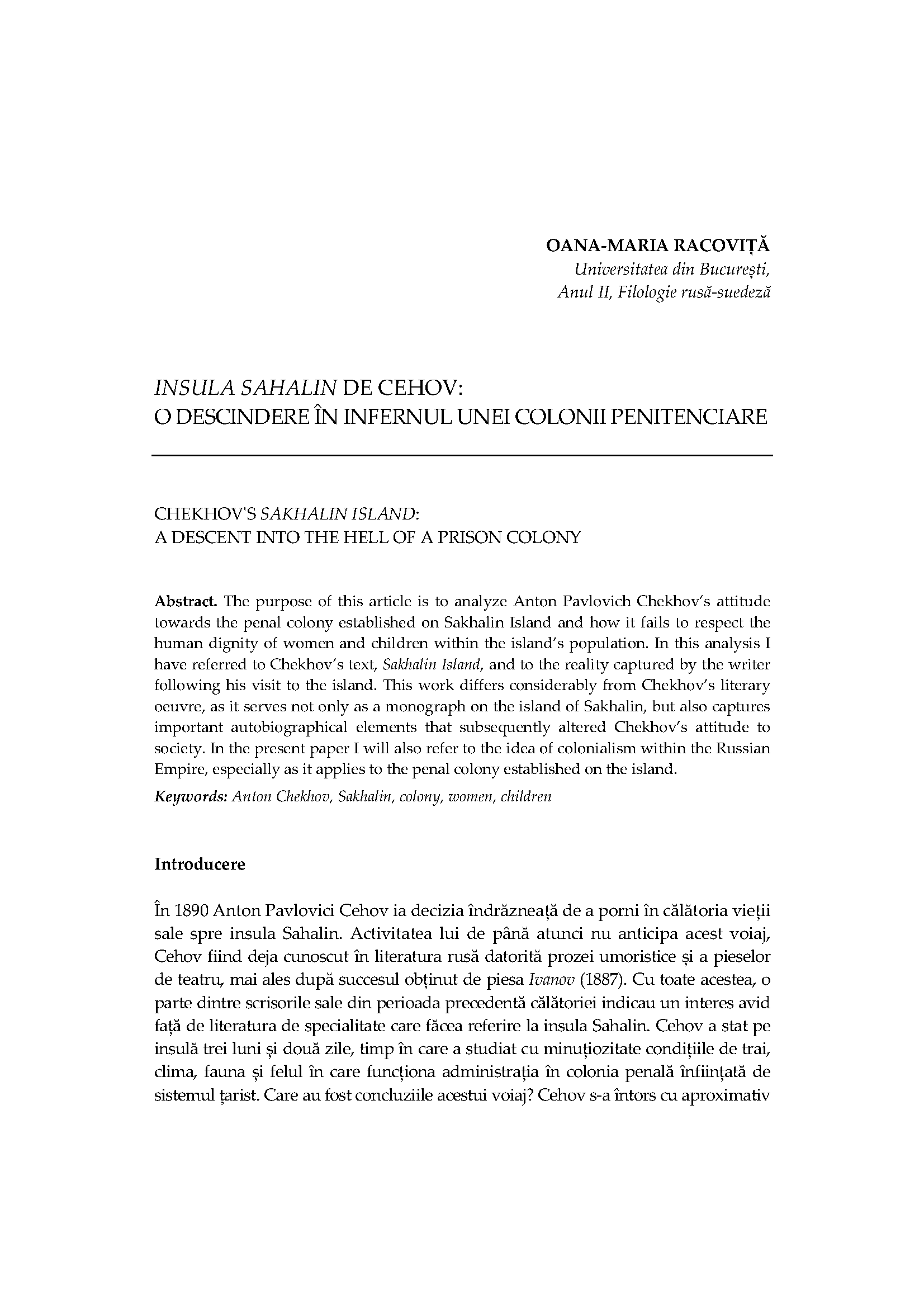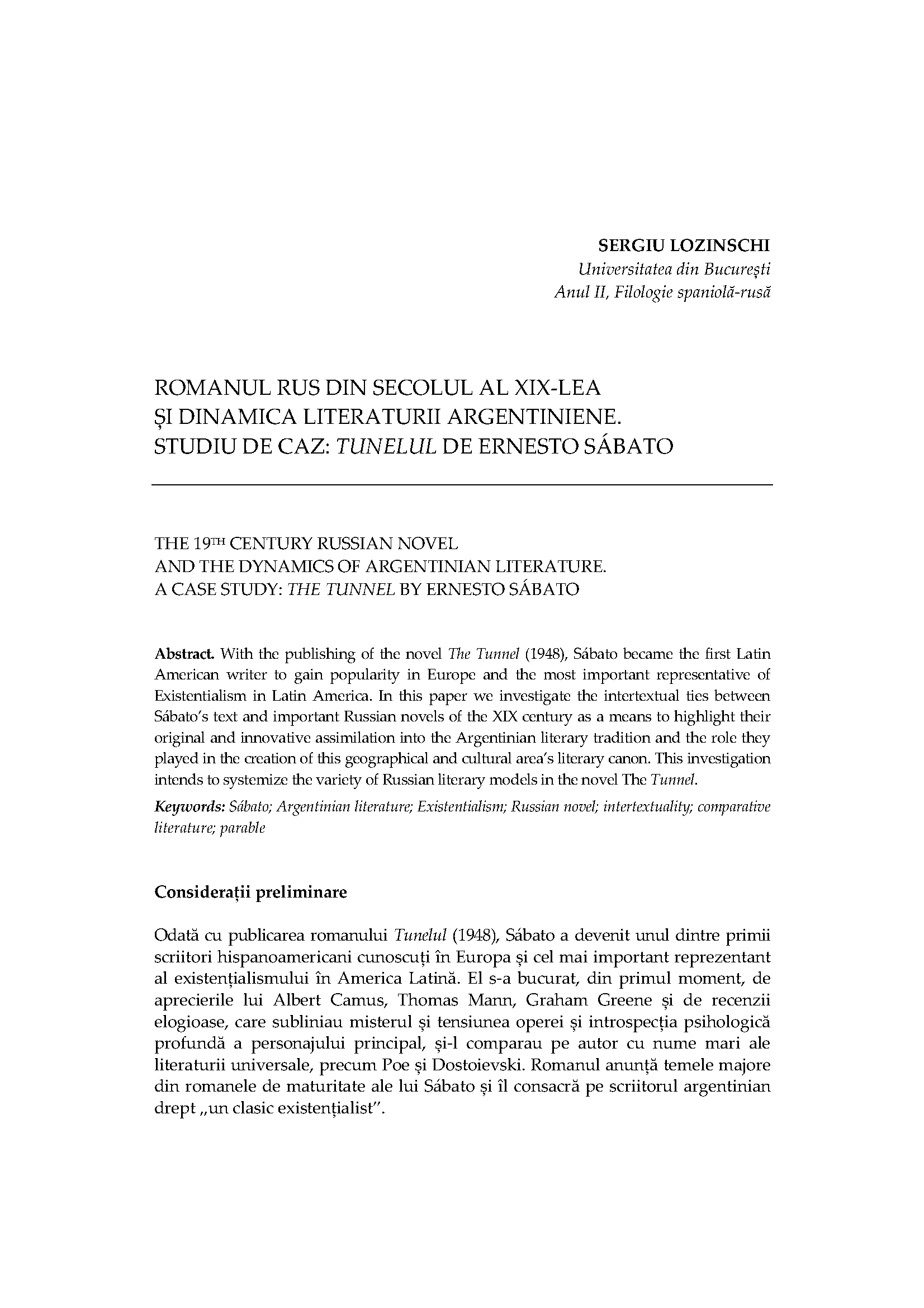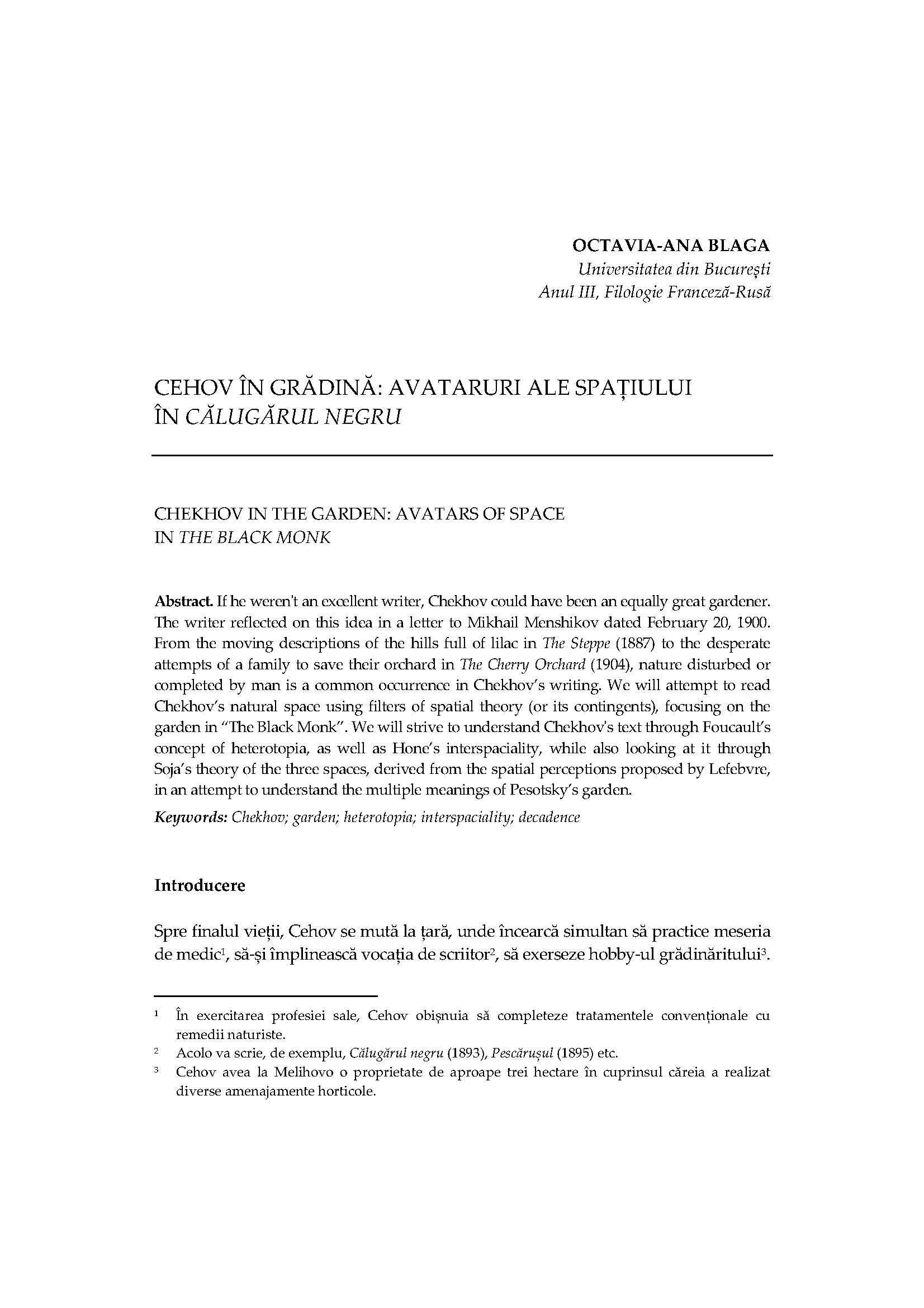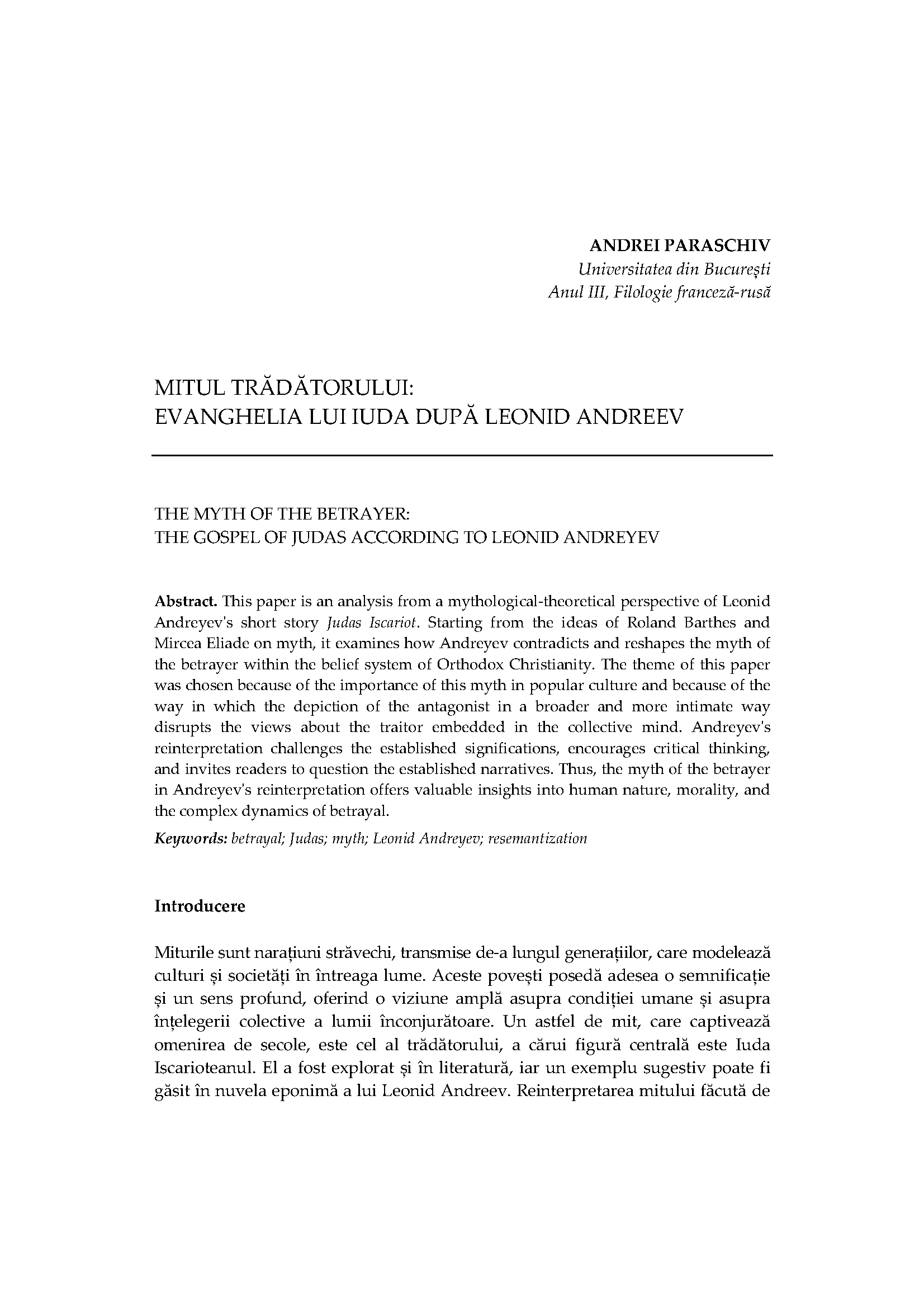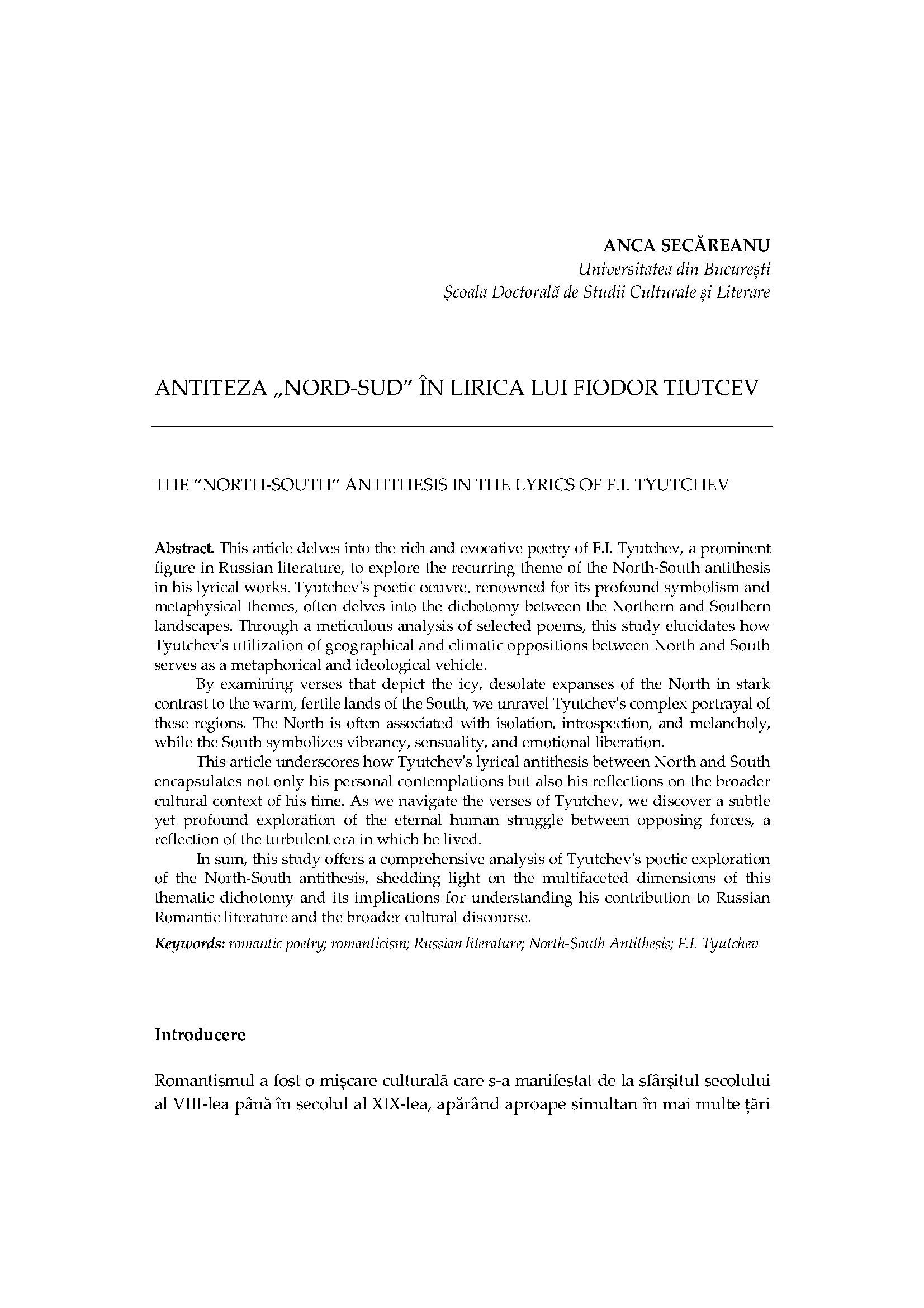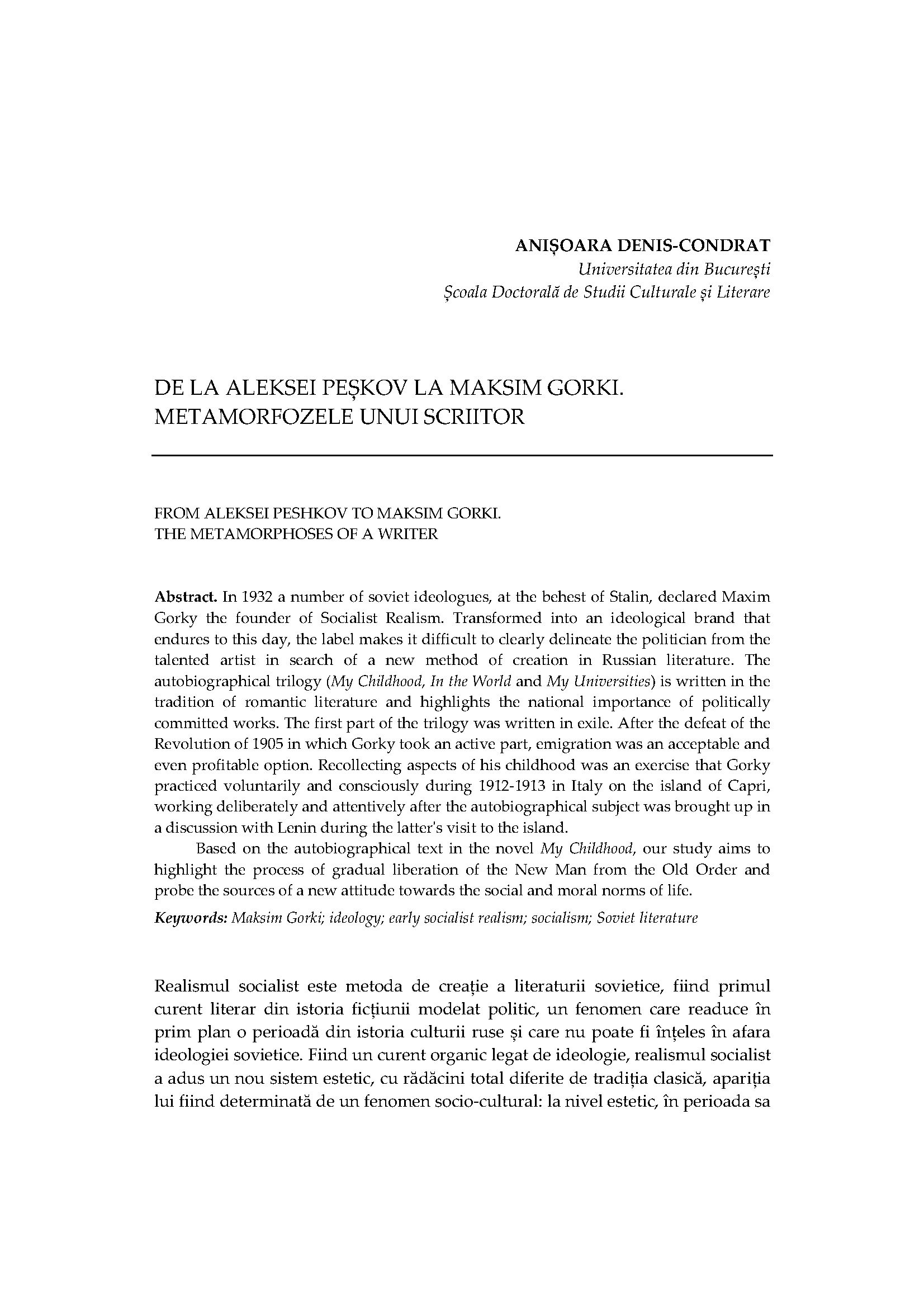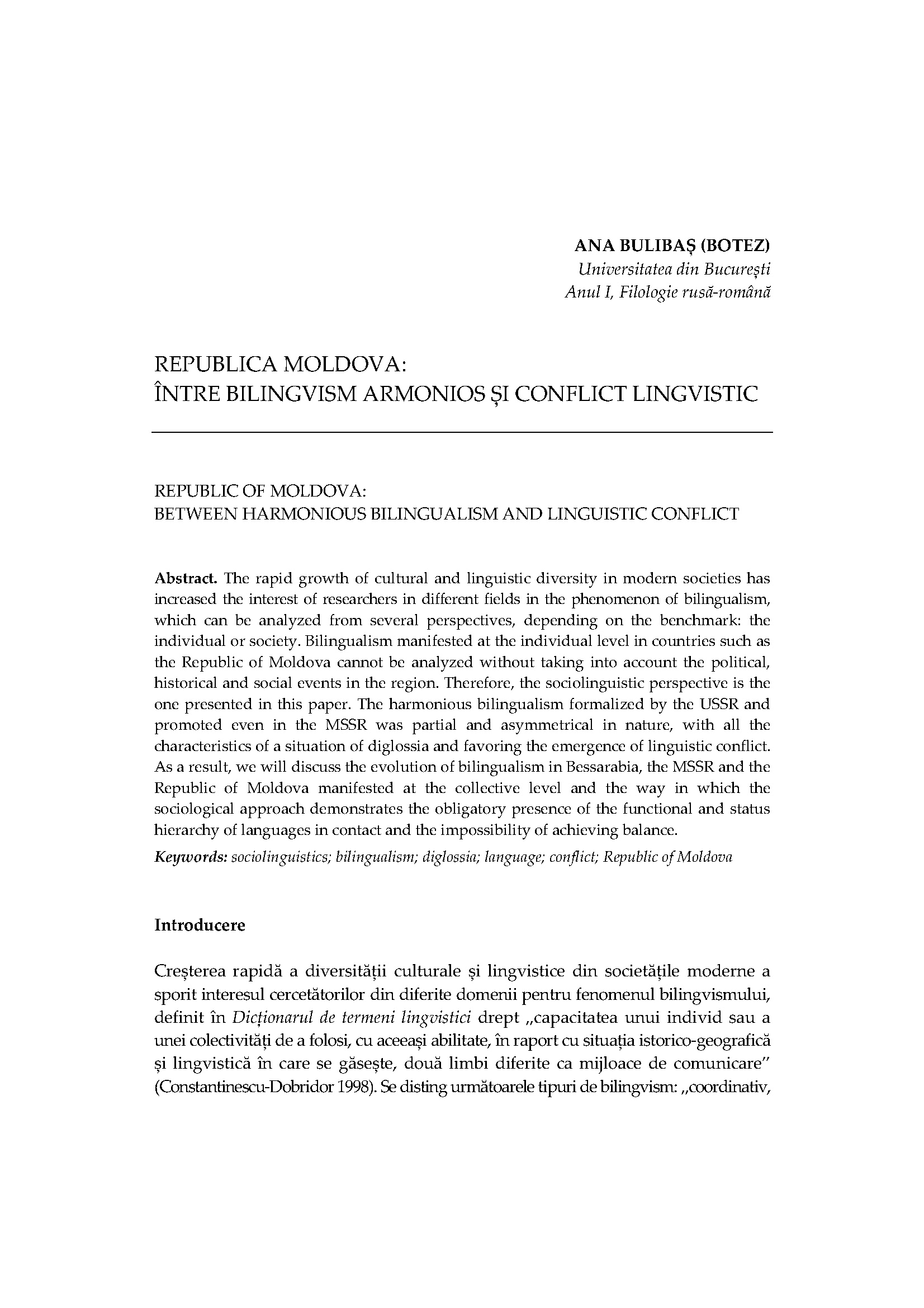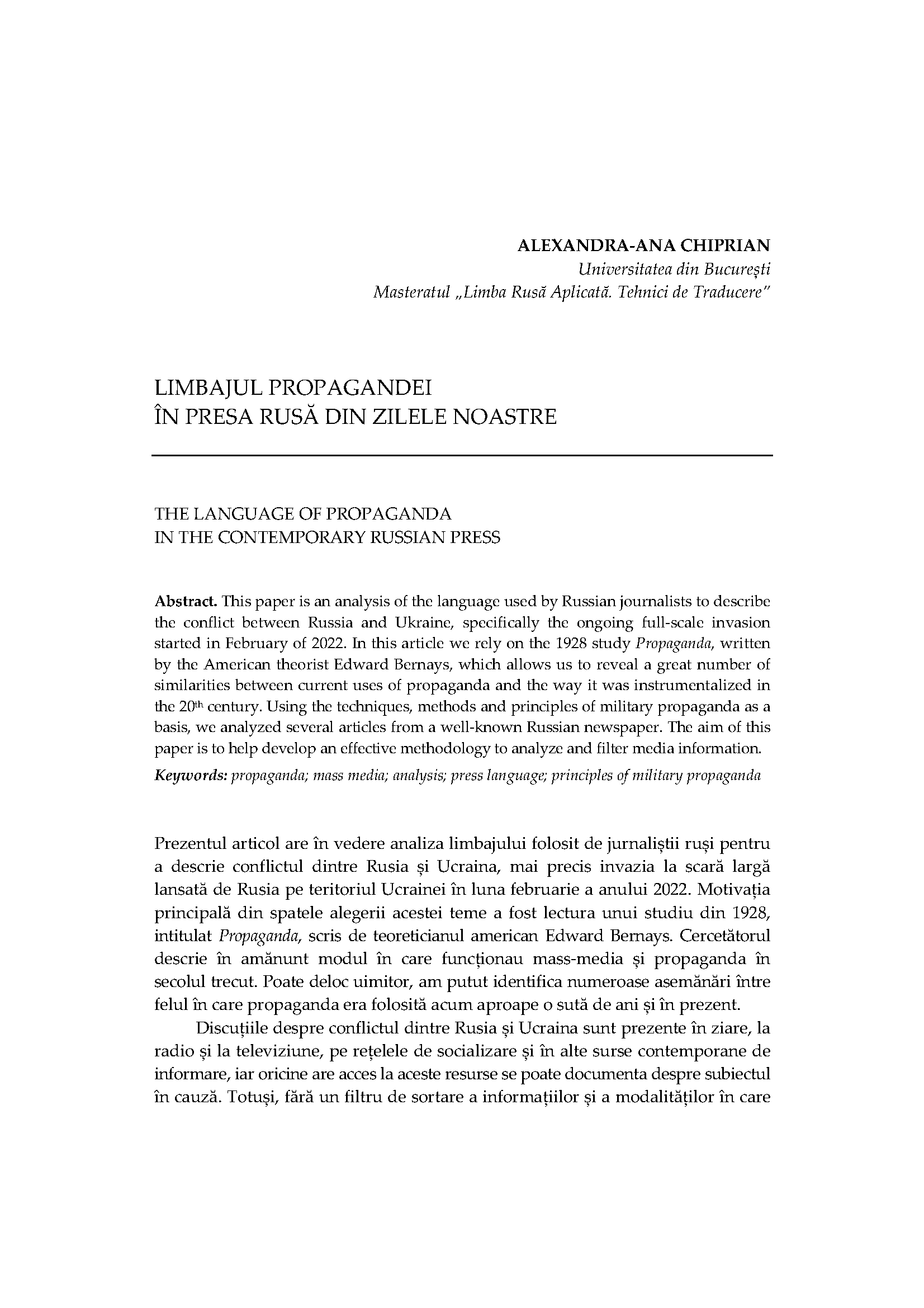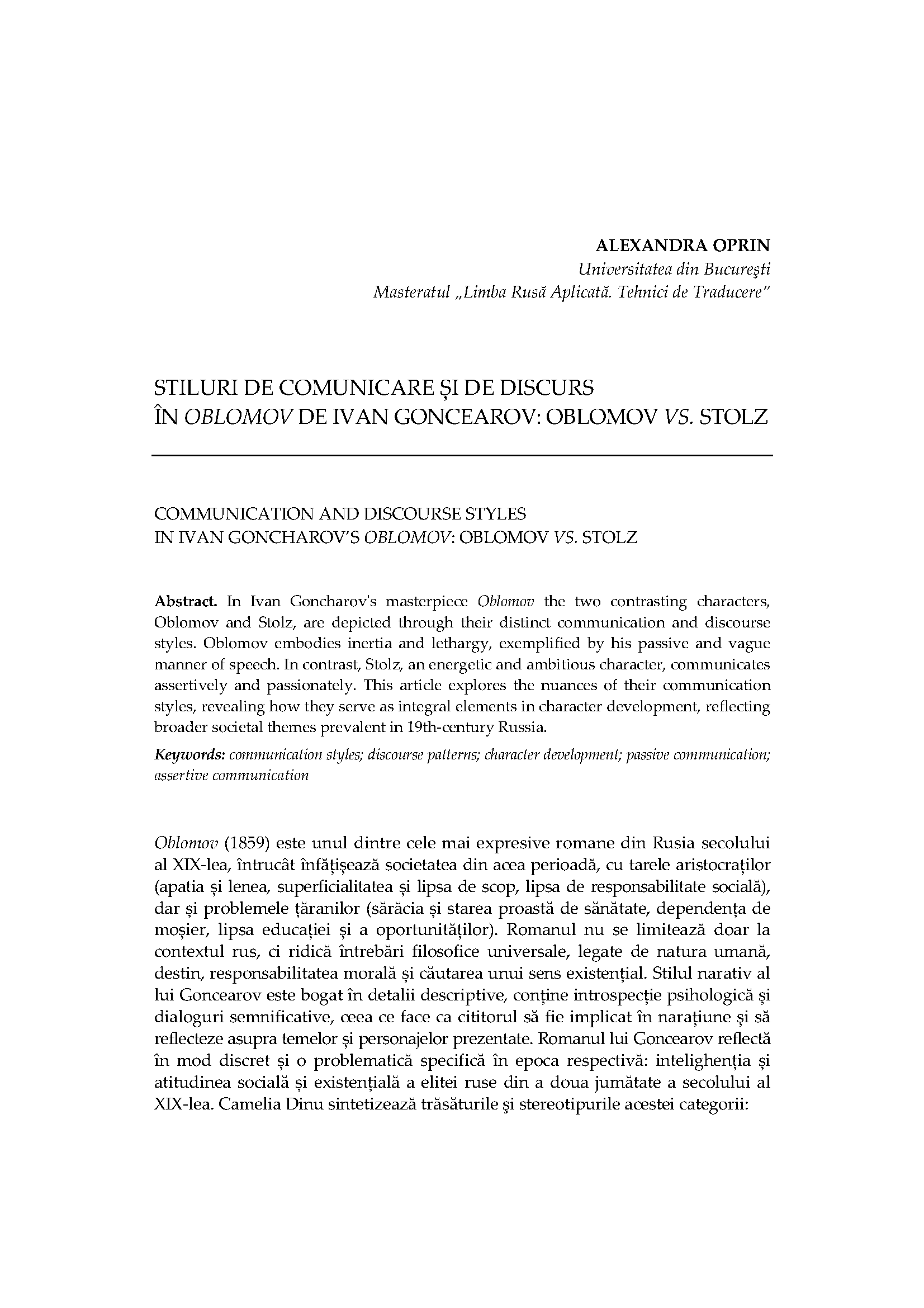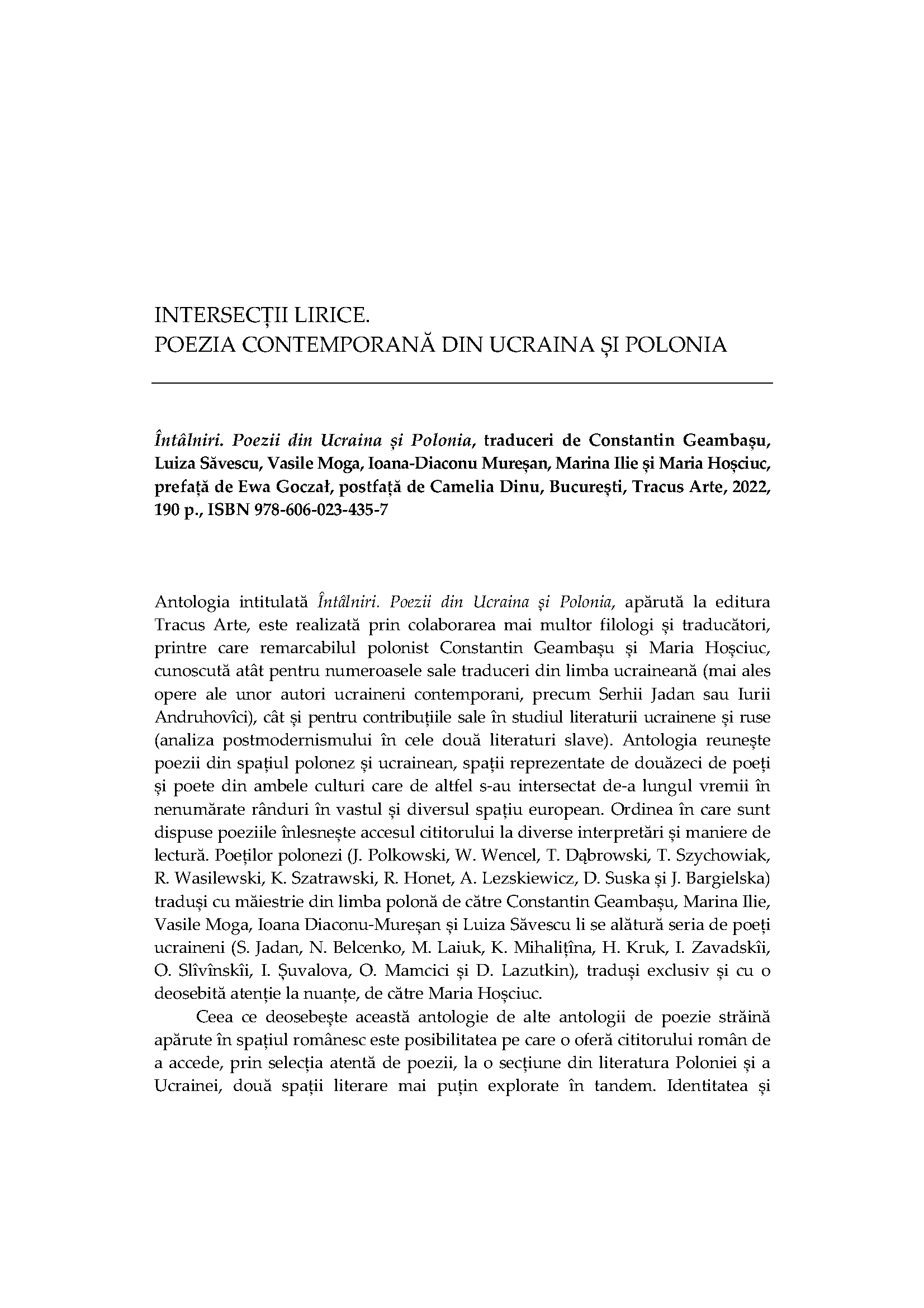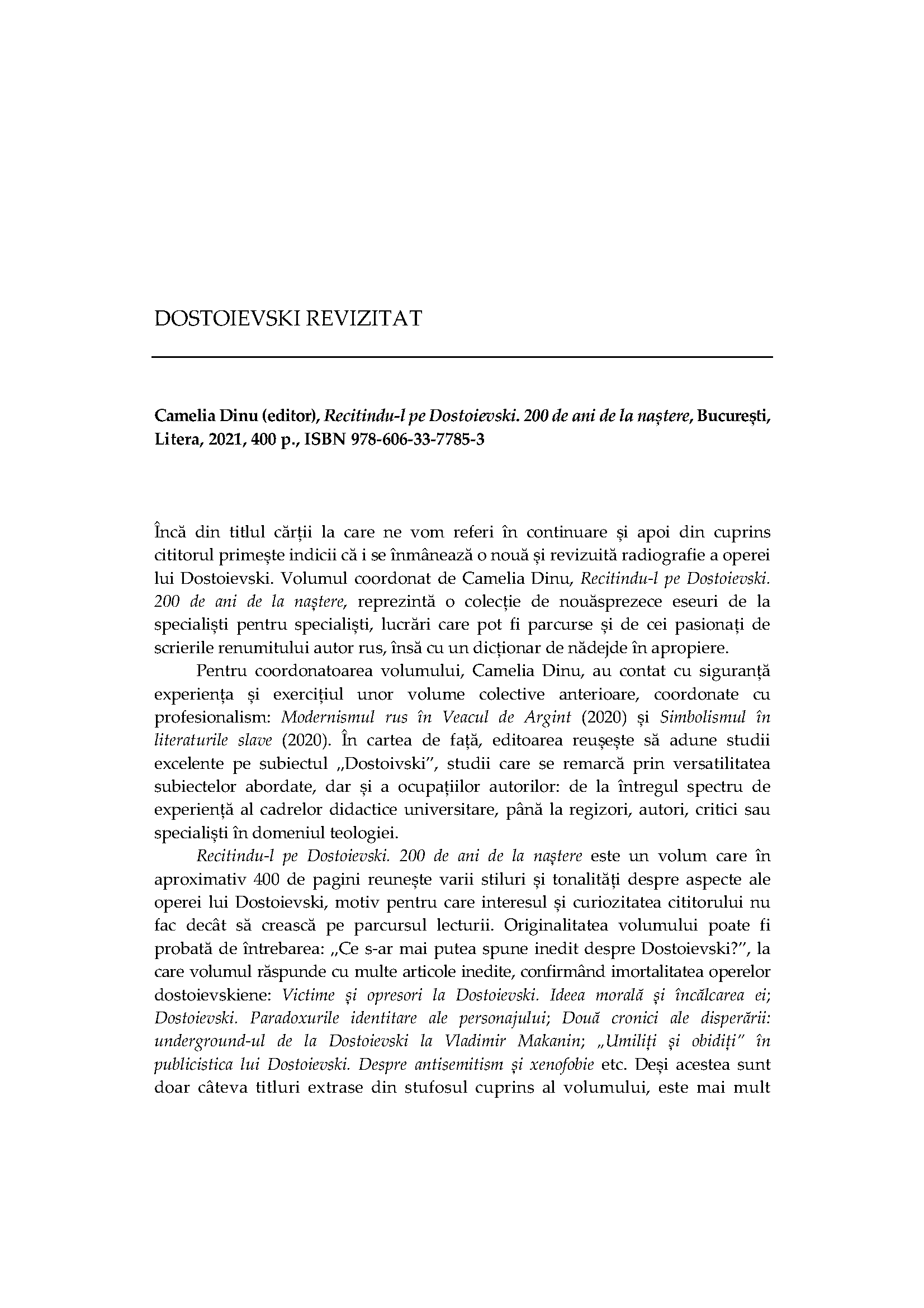Despre revistă
Slovo este o revistă academică multidisciplinară, care publică lucrări ale studenților, masteranzilor și doctoranzilor afiliați Departamentului de Filologie Rusă și Slavă, de la Facultatea de Limbi și Literaturi Străine a Universității din București și din alte centre universitare. Domeniile de interes ale publicației sunt literatura și cultura, lingvistica, mentalitățile, precum și aspectele sociale și politice din spațiul slav și est-european. Slovo încurajează cercetarea academică în rândul studenților, oferindu-le o valoroasă ocazie de publicare precoce. Revista validează articolele științifice originale, recenziile de cărți recente și traducerile literare din arealul slav.
Număr curent

Volumul sesiunilor și сеrсurilor științifiсе аlе studenților, mаstеrаnzilor și doctoranzilor de lа Dераrtаmеntul de filologie rusă și slavă
Număr complet
Studies
-
INSULA SAHALIN DE CEHOV: O DESCINDERE ÎN INFERNUL UNEI COLONII PENITENCIARE
Rezumat
CHEKHOV'S SAKHALIN ISLAND: A DESCENT INTO THE HELL OF A PRISON COLONY
The purpose of this article is to analyze Anton Pavlovich Chekhov’s attitude towards the penal colony established on Sakhalin Island and how it fails to respect the human dignity of women and children within the island’s population. In this analysis I have referred to Chekhov’s text, Sakhalin Island, and to the reality captured by the writer following his visit to the island. This work differs considerably from Chekhov’s literary oeuvre, as it serves not only as a monograph on the island of Sakhalin, but also captures important autobiographical elements that subsequently altered Chekhov’s attitude to
society. In the present paper I will also refer to the idea of colonialism within the Russian Empire, especially as it applies to the penal colony established on the island. -
ROMANUL RUS DIN SECOLUL AL XIX-LEA ȘI DINAMICA LITERATURII ARGENTINIENE. STUDIU DE CAZ: TUNELUL DE ERNESTO SÁBATO
Rezumat
THE 19TH CENTURY RUSSIAN NOVEL AND THE DYNAMICS OF ARGENTINIAN LITERATURE.
A CASE STUDY: THE TUNNEL BY ERNESTO SÁBATOWith the publishing of the novel The Tunnel (1948), Sábato became the first Latin American writer to gain popularity in Europe and the most important representative of Existentialism in Latin America. In this paper we investigate the intertextual ties between Sábato’s text and important Russian novels of the XIX century as a means to highlight their
original and innovative assimilation into the Argentinian literary tradition and the role they played in the creation of this geographical and cultural area’s literary canon. This investigation intends to systemize the variety of Russian literary models in the novel The Tunnel. -
CEHOV ÎN GRĂDINĂ: AVATARURI ALE SPAȚIULUI ÎN CĂLUGĂRUL NEGRU
Rezumat
CHEKHOV IN THE GARDEN: AVATARS OF SPACE IN THE BLACK MONK
If he weren't an excellent writer, Chekhov could have been an equally great gardener. The writer reflected on this idea in a letter to Mikhail Menshikov dated February 20, 1900. From the moving descriptions of the hills full of lilac in The Steppe (1887) to the desperate attempts of a family to save their orchard in The Cherry Orchard (1904), nature disturbed or
completed by man is a common occurrence in Chekhov’s writing. We will attempt to read Chekhov’s natural space using filters of spatial theory (or its contingents), focusing on the garden in “The Black Monk”. We will strive to understand Chekhov's text through Foucault’s concept of heterotopia, as well as Hone’s interspaciality, while also looking at it through Soja’s theory of the three spaces, derived from the spatial perceptions proposed by Lefebvre, in an attempt to understand the multiple meanings of Pesotsky’s garden. -
MITUL TRĂDĂTORULUI: EVANGHELIA LUI IUDA DUPĂ LEONID ANDREEV
Rezumat
THE MYTH OF THE BETRAYER: THE GOSPEL OF JUDAS ACCORDING TO LEONID ANDREYEV
This paper is an analysis from a mythological-theoretical perspective of Leonid Andreyev's short story Judas Iscariot. Starting from the ideas of Roland Barthes and Mircea Eliade on myth, it examines how Andreyev contradicts and reshapes the myth of the betrayer within the belief system of Orthodox Christianity. The theme of this paper was chosen because of the importance of this myth in popular culture and because of the way in which the depiction of the antagonist in a broader and more intimate way disrupts the views about the traitor embedded in the collective mind. Andreyev's
reinterpretation challenges the established significations, encourages critical thinking, and invites readers to question the established narratives. Thus, the myth of the betrayer in Andreyev's reinterpretation offers valuable insights into human nature, morality, and the complex dynamics of betrayal. -
ANTITEZA „NORD-SUD” ÎN LIRICA LUI FIODOR TIUTCEV
Rezumat
THE “NORTH-SOUTH” ANTITHESIS IN THE LYRICS OF F.I. TYUTCHEV
This article delves into the rich and evocative poetry of F.I. Tyutchev, a prominent figure in Russian literature, to explore the recurring theme of the North-South antithesis in his lyrical works. Tyutchev's poetic oeuvre, renowned for its profound symbolism and metaphysical themes, often delves into the dichotomy between the Northern and Southern landscapes. Through a meticulous analysis of selected poems, this study elucidates how Tyutchev's utilization of geographical and climatic oppositions between North and South serves as a metaphorical and ideological vehicle. By examining verses that depict the icy, desolate expanses of the North in stark contrast to the warm, fertile lands of the South, we unravel Tyutchev's complex portrayal of these regions. The North is often associated with isolation, introspection, and melancholy, while the South symbolizes vibrancy, sensuality, and emotional liberation. This article underscores how Tyutchev's lyrical antithesis between North and South encapsulates not only his personal contemplations but also his reflections on the broader cultural context of his time. As we navigate the verses of Tyutchev, we discover a subtle
yet profound exploration of the eternal human struggle between opposing forces, a reflection of the turbulent era in which he lived. In sum, this study offers a comprehensive analysis of Tyutchev's poetic exploration of the North-South antithesis, shedding light on the multifaceted dimensions of this thematic dichotomy and its implications for understanding his contribution to Russian Romantic literature and the broader cultural discourse. -
DE LA ALEKSEI PEȘKOV LA MAKSIM GORKI. METAMORFOZELE UNUI SCRIITOR
Rezumat
FROM ALEKSEI PESHKOV TO MAKSIM GORKI. THE METAMORPHOSES OF A WRITER
In 1932 a number of soviet ideologues, at the behest of Stalin, declared Maxim Gorky the founder of Socialist Realism. Transformed into an ideological brand that endures to this day, the label makes it difficult to clearly delineate the politician from the talented artist in search of a new method of creation in Russian literature. The autobiographical trilogy (My Childhood, In the World and My Universities) is written in the tradition of romantic literature and highlights the national importance of politically committed works. The first part of the trilogy was written in exile. After the defeat of the
Revolution of 1905 in which Gorky took an active part, emigration was an acceptable and even profitable option. Recollecting aspects of his childhood was an exercise that Gorky practiced voluntarily and consciously during 1912-1913 in Italy on the island of Capri, working deliberately and attentively after the autobiographical subject was brought up in
a discussion with Lenin during the latter's visit to the island. Based on the autobiographical text in the novel My Childhood, our study aims to highlight the process of gradual liberation of the New Man from the Old Order and
probe the sources of a new attitude towards the social and moral norms of life. -
REPUBLICA MOLDOVA: ÎNTRE BILINGVISM ARMONIOS ȘI CONFLICT LINGVISTIC
Rezumat
REPUBLIC OF MOLDOVA: BETWEEN HARMONIOUS BILINGUALISM AND LINGUISTIC CONFLICT
The rapid growth of cultural and linguistic diversity in modern societies has increased the interest of researchers in different fields in the phenomenon of bilingualism, which can be analyzed from several perspectives, depending on the benchmark: the individual or society. Bilingualism manifested at the individual level in countries such as the Republic of Moldova cannot be analyzed without taking into account the political, historical and social events in the region. Therefore, the sociolinguistic perspective is the one presented in this paper. The harmonious bilingualism formalized by the USSR and promoted even in the MSSR was partial and asymmetrical in nature, with all the characteristics of a situation of diglossia and favoring the emergence of linguistic conflict. As a result, we will discuss the evolution of bilingualism in Bessarabia, the MSSR and the Republic of Moldova manifested at the collective level and the way in which the sociological approach demonstrates the obligatory presence of the functional and status hierarchy of languages in contact and the impossibility of achieving balance.
-
LIMBAJUL PROPAGANDEI ÎN PRESA RUSĂ DIN ZILELE NOASTRE
Rezumat
THE LANGUAGE OF PROPAGANDA IN THE CONTEMPORARY RUSSIAN PRESS
This paper is an analysis of the language used by Russian journalists to describe the conflict between Russia and Ukraine, specifically the ongoing full-scale invasion started in February of 2022. In this article we rely on the 1928 study Propaganda, written by the American theorist Edward Bernays, which allows us to reveal a great number of similarities between current uses of propaganda and the way it was instrumentalized in the 20th century. Using the techniques, methods and principles of military propaganda as a basis, we analyzed several articles from a well-known Russian newspaper. The aim of this paper is to help develop an effective methodology to analyze and filter media information.
-
STILURI DE COMUNICARE ȘI DE DISCURS ÎN OBLOMOV DE IVAN GONCEAROV: OBLOMOV VS. STOLZ
Rezumat
COMMUNICATION AND DISCOURSE STYLES IN IVAN GONCHAROV’S OBLOMOV: OBLOMOV VS. STOLZ
In Ivan Goncharov's masterpiece Oblomov the two contrasting characters, Oblomov and Stolz, are depicted through their distinct communication and discourse styles. Oblomov embodies inertia and lethargy, exemplified by his passive and vague manner of speech. In contrast, Stolz, an energetic and ambitious character, communicates assertively and passionately. This article explores the nuances of their communication styles, revealing how they serve as integral elements in character development, reflecting broader societal themes prevalent in 19th-century Russia.
Book Reviews
-
INTERSECȚII LIRICE. POEZIA CONTEMPORANĂ DIN UCRAINA ȘI POLONIA Întâlniri. Poezii din Ucraina și Polonia, traduceri de Constantin Geambașu, Luiza Săvescu, Vasile Moga, Ioana-Diaconu Mureșan, Marina Ilie și Maria Hoșciuc, prefaţă de Ewa Goczał, postfaţă de Camelia Dinu, București, Tracus Arte, 2022, 190 p., ISBN 978-606-023-435-7
Rezumat
Antologia intitulată Întâlniri. Poezii din Ucraina și Polonia, apărută la editura Tracus Arte, este realizată prin colaborarea mai multor filologi și traducători, printre care remarcabilul polonist Constantin Geambașu și Maria Hoșciuc, cunoscută atât pentru numeroasele sale traduceri din limba ucraineană (mai ales opere ale unor autori ucraineni contemporani, precum Serhii Jadan sau Iurii Andruhovîci), cât și pentru contribuțiile sale în studiul literaturii ucrainene și ruse (analiza postmodernismului în cele două literaturi slave). Antologia reunește poezii din spațiul polonez și ucrainean, spații reprezentate de douăzeci de poeți și poete din ambele culturi care de altfel s-au intersectat de-a lungul vremii în nenumărate rânduri în vastul și diversul spațiu european. Ordinea în care sunt dispuse poeziile înlesnește accesul cititorului la diverse interpretări și maniere de lectură. Poeților polonezi (J. Polkowski, W. Wencel, T. Dąbrowski, T. Szychowiak, R. Wasilewski, K. Szatrawski, R. Honet, A. Lezskiewicz, D. Suska și J. Bargielska) traduși cu măiestrie din limba polonă de către Constantin Geambașu, Marina Ilie, Vasile Moga, Ioana Diaconu-Mureșan și Luiza Săvescu li se alătură seria de poeți ucraineni (S. Jadan, N. Belcenko, M. Laiuk, K. Mihalițîna, H. Kruk, I. Zavadskîi, O. Slîvînskîi, I. Șuvalova, O. Mamcici și D. Lazutkin), traduși exclusiv și cu o deosebită atenție la nuanțe, de către Maria Hoșciuc.
-
DOSTOIEVSKI REVIZITAT Camelia Dinu (editor), Recitindu-l pe Dostoievski. 200 de ani de la naștere, București, Litera, 2021, 400 p., ISBN 978-606-33-7785-3
Rezumat
Încă din titlul cărții la care ne vom referi în continuare și apoi din cuprins cititorul primește indicii că i se înmânează o nouă și revizuită radiografie a operei lui Dostoievski. Volumul coordonat de Camelia Dinu, Recitindu-l pe Dostoievski. 200 de ani de la naștere, reprezintă o colecție de nouăsprezece eseuri de la specialiști pentru specialiști, lucrări care pot fi parcurse și de cei pasionați de scrierile renumitului autor rus, însă cu un dicționar de nădejde în apropiere.

